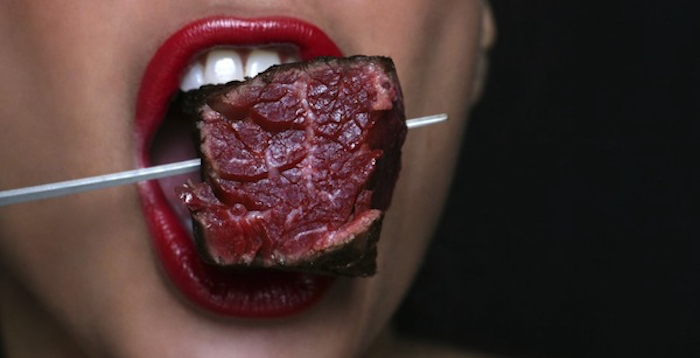So there’s this widely lauded award-nominated film, Poor Things, that purports to depict a positive portrait of feminist sexuality. In this motion picture, a slimy perv creates a being–who calls her maker God–that basically boasts the body of a woman and the mind of a child. Ah, but no worries Ladies, because soon a handsome, young virile hero appears in her life to stand by her side as she uses her wits and cunning to overcome and rise above this terrible situation–finding a sparkling new life in which she claims free agency and discovers the magic of mutually consensual, healthful relations, discovering herself and her own worth at the same time.
Um, nope. Actually, that’s not the plot of the movie. At all. Instead, the heroine known as Bella Baxter is molested and kidnapped by yet another slimy perv–only she happens to prefer this slimy perv better than the last one, so the two embark on a root tootin erotic adventure that finds her drifting into prostitution, humping everything that moves–and some things that don’t–and (or so it’s implied in one oh so memorable scenario) having sex with a man as his two minor sons watch.
Why do I think that the FBI is going to bust down my door at any given moment now, just for typing that last hideous sentence? Ah, no, it’s just the Pizza Guy. Whew! That was a close one.
But seriously, Folks–this supposed take on women’s sexuality, written by a man, directed by a man, based on a book by a man, are we seeing a pattern here?–breaks more rules of feminist erotica (and, as a bonus, human decency) than I can count.
Plus it breaks the cardinal rule of pissing off The Feminist Sexpert–something that far too many faux feminist sex flicks have a tendency to do.
Another prime example takes the form of Breaking the Waves, a 1996 award winner written and directed by a man, that tells the tale of a woman’s sexual awakening. Bess’ introduction to sex is actually a nurturing and jovial one, as she and her husband enjoy a blissful honeymoon–with her loving mate introducing her to the joys of marital intercourse. Why couldn’t the movie be about that? But nooo–the hubby is permanently disabled in an accident. And when he encourages her to seek sensual satisfaction in the arms of other men, does she find a hunky gardener to do the job–ala Sean Bean in Lady Chatterley’s Lover? Nope. She JO’s an old dude on a bus before running from said bus and throwing up. Then, as an encore, she has herself shipped out to a workmans’ boat, where she is beaten and raped. Then she dies.
My biggest issue with these films lies in the display, objectification and abuse of the female body for a fraudulent purpose; the attempt to deceive the viewer into the belief that, as long as you show a gal having lots and lots of sex–consensual or otherwise–you are celebrating her sexuality.
Want to celebrate a woman’s sexuality? Tell a story in which a mature, capable woman embarks on sensual adventures with partners her own age and attractiveness level (or perhaps younger, providing that they are of legal age), with no elements of violence or coercion. Show them laughing, learning, having fun, and climaxing all over the place. Show just as much of the male body as you do its female equivalent. And go beyond the body to show and celebrate who she is a person. Above all, stop calling her a thing.
It goes without saying, of course, that we need more women telling women’s stories on film, in this and all genres. Yet, sadly, I can’t quite let the ladies off the hook. The Fifty Shades series, written and directed by women and based on a book written by a woman. 365 Days, directed and written by a mixed team, based on a book by a woman. Catherine Breillat’s Romance, written and directed by a woman. 9 and a Half Weeks, directed by a man, written by a mixed writing team, based on a book by a woman. Secretary, directed by a man, written by a mixed team. All of these works imply that women derive pleasure from pain and humiliation.
By contrast, the films A Night in Heaven (directed by a man, written by a woman), Thief of Hearts (directed by a man, written by another man), Good Luck to You, Leo Grande (directed and written by women), Coming Soon (written and directed by women), the Magic Mike series (written and directed by men), The Stud (directed by a man, written by a mixed team, based on a book by a woman), the latest version of Lady Chatterley’s Lover (the most recent version of which was directed by a woman, written by a man, and based on a book by a man), Addicted (directed by a man, written by a mixed team, based on a book by a woman), Cheri (directed by a man, written by a man, based on a book by a woman), Blue Bayou (directed and written by women), Cabin Fever (directed and written by women, based on a book by a woman), Paris, France (directed and written by men), and The Love Scenes series (directed by a man, written by men and women) all did a flawless job of telling romantic stories of women finding sexual liberation through the exploration of their fantasies–and at the hands of men who coax and seduce, not force.
The point is that people of all genders and persuasions can convey a positive, healthy portrayal of women’s sexuality in the cinema–and they also can sell women a royal bill of goods by releasing misogynistic crap.
Furthermore, a male critic–reporting for the Beniverse Movie Review Channel–pretty much shared my viewpoints about Poor Things in his amazing review, “Poor Things Can’t Escape the Male Gaze.” And one of his viewers summed up the movie perfectly in the comments.
“So, it’s really not about empowering women sexually; it’s just another man’s sex fantasy.”



































